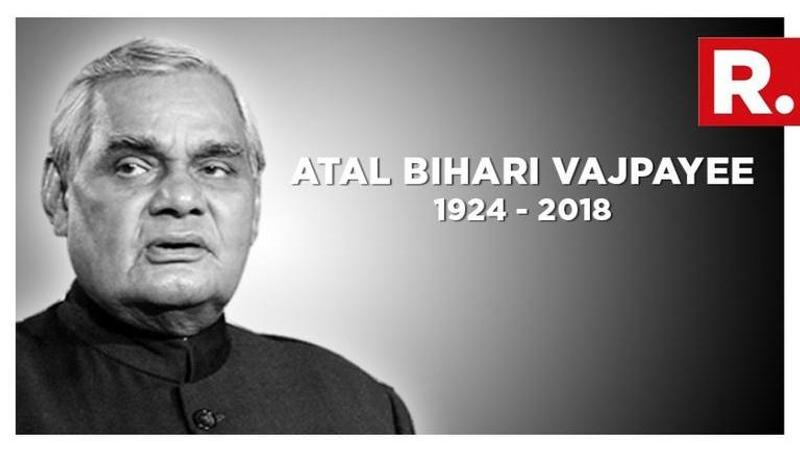Published 17:38 IST, August 16th 2018
Former Prime Minister Atal Bihari Vajpayee passes away at 93
After being admitted to AIIMS on Monday, June 11, following complaints related to respiratory and kidney ailments, former Prime Minister Atal Bihari Vajpayee has passed away, the premier medical institute has announced.

After being admitted to AIIMS on Monday, June 11, following complaints related to respiratory and kidney ailments, former Prime Minister Atal Bihari Vajpayee has passed away, the premier medical institute has announced.
In a bulletin released at about half-past-five on Thursday, AIIMS stated that the former Prime Minister passed away at 5:05 pm. It highlighted that he had been stable under the care of the team of AIIMS doctors, but that his condition deteriorated over the last 36 hours, requiring him to be placed on life-support systems.
Hours earlier, AIIMS had said that there hadn't been any change in his condition from the previous night when he had been critical.
(The AIIMS statement hours before Atal Bihari Vajpayee's demise)
The 93-year-old, who was a towering figure in Indian politics for a number of decades, since the time that Jawaharlal Nehru was the Prime Minister, first assumed the top office in 1996 and then again in 1998. Between the 1999 general elections and 2004, Vajpayee became the first non-Congress Prime Minister of India to complete a full term.
His efforts, along with those of fellow-BJP stalwart LK Advani, led to the rise of the BJP, initially as the only national challenger to the then-dominant Congress, and more recently, to the biggest political party in the world in terms of membership.
A number of massive events took place in the country during Vajpayee's Prime Minister-ship, ranging from the Pokhran-2 nuclear tests to the Kargil war in terms of issues of national security and the increased liberalisation of the Indian economy and a massive infrastructure push on the development front. The economic growth India witnessed at the time led to the BJP adopting 'India Shining' as its campaign slogan in the ill-fated 2004 general elections.
Apart from being an enormously influential politician, Vajpayee was also a prolific author, penning books on India's social and political dynamic as well as collections of his poetry.
(Former PM Atal Bihari Vajpayee with late former President APJ Abdul Kalam -- two names that are forever entwined in India's history)
Vajpayee was elected to the Lok Sabha for the first time in 1957 -- in India's second-ever general elections. His last election to India's Parliament was in 2004. In 2009, Vajpayee suffered a stroke which impaired his speech and eventually led to his being confined to a wheelchair.
(Atal Bihari Vajpayee played a defining role in the rise of the BJP)
A number of past and present leaders visited Vajpayee over the course of his treatment at AIIMS, particularly in the days immediately following him being admitted. Current Prime Minister Narendra Modi, as well as former PMs Manmohan Singh and HD Deve Gowda visited him, as did BJP party president Amit Shah, Rahul Gandhi, LK Advani, Home Minister Rajnath Singh, among others. Chief Ministers Mamata Banerjee and Chandrababu Naidu also visited him while they were in the capital for the meeting of the Niti Aayog. The Prime Minister visited him on the evening of August 15 and also on Thursday, as his condition deteriorated.
(Prime Minister Narendra Modi -- then CM of Gujarat -- with the man he described as his mentor)
Vajpayee assumed his first cabinet role all the way back in 1977 in the Morarji Desai-led government as the Minister of External Affairs. The Bharat Ratna, the country's highest civilian honour, was conferred upon him in 2015. The current Narendra Modi-led government has named a number of schemes after him, namely the Atal Pension Yojana as well as the Atal Mission for Rejuvenation and Urban Transformation.
Updated 18:28 IST, August 16th 2018










